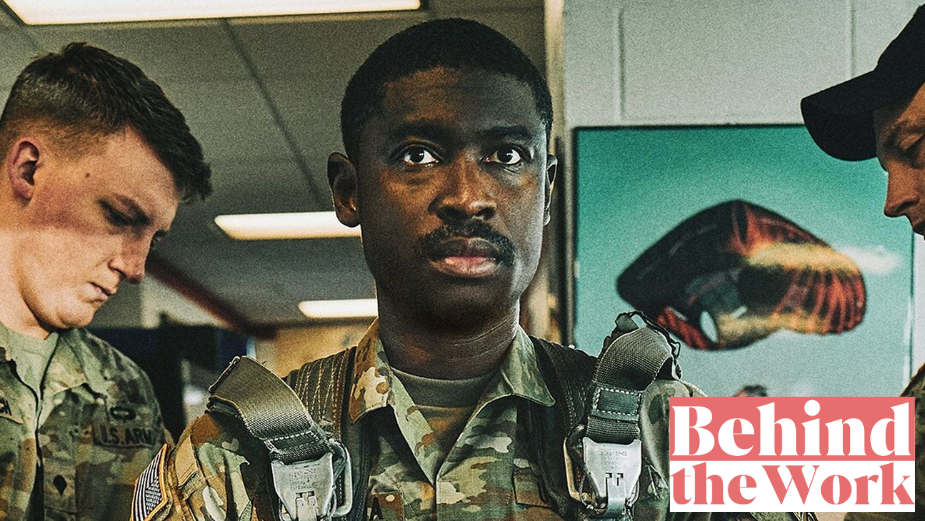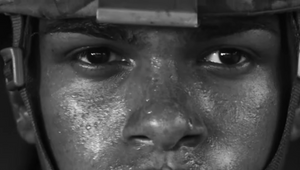
Be All You Can Be: How the US Army Is Aiming to Attract Gen Z

Gen z is currently, give or take, between the ages of nine and 24 years old. They are either already adults or will be soon.
Among many other things, this (quite terrifying) fact means that militaries, more specifically the US Army in this case, will be primarily made up of gen z-ers over the course of the next 20 years and further afield.
Team DDB, Omnicom's dedicated agency for US Army advertising, is preparing for that reality with the revitalisation of one of the US Army's most iconic advertising taglines, 'Be All You Can Be'. Its 2023 reincarnation takes the form of a series of new films that aim to offer American youth an unfiltered look at the lives of today's soldiers.
Each of the three films demonstrate the possibilities of US Army service for gen z by aligning to specific attributes that research has suggested they want to see in their careers: meaning ('First Patch'), skills ('First Target'), and belonging ('First Arrival').
For direction, Team DDB enlisted Hoffman + Metoyer, known for their work with non- actors, to capture real-life moments in a style that intersects documentary, fiction, and experimental cinema. Michael Christopher Brown, a former war photographer with experience directing consumer marketing campaigns, led the direction of the three films with Hoffman + Metoyer.
To find out more about the strategy of speaking to gen z, capturing the films in an authentic way, and the responsibility of not sugar-coating its messaging, LBB's Addison Capper spoke with Team DDB.
LBB> What are the key factors that are driving your strategy for the U.S. Army right now?
Team DDB> When gen z closes their eyes and says ‘US Army’, they see the previous 20 years of the Army, as viewed through the lens of media and movies. Or they can’t really picture it at all. They don’t see the next 20 years, nor can they imagine themselves being part of it. When in fact, 20 years from now the US Army will be in large proportion composed of gen z! So we are driven by the need to help today’s youth to see the Army as a driver of possibilities for their own life, and to position the Army as a part of culture (versus apart from it) — the institution that promotes and defends the idea of possibilities more than any other employer brand could.
LBB> Can you elaborate further on why you are particularly focusing on communicating to gen z?
Team DDB> Because that’s the generation with the most people of recruitment age; it’s not just about building brand affinity at a young age. From extensive primary research we know this generation believes that they are unlikely to outrun their parents or their provenance in terms of quality of life and achieving their dreams. They’ve grown up witnessing institutional failure and societal discord and they don’t see the possibilities previous generations enjoyed for themselves. But! They very much want two things: 1) to make a dent in the universe (a.k.a., positively impact the world), and 2) to be all they can be. The Army is REALLY good at helping them with both, but most have never considered it to be a place or a path for them.
LBB> What does your research reveal about how that generation feels towards the military and potentially serving?
Team DDB> It’s hard to imagine being a part of something you’ve never seen. Army bases remain far from city centres, which have grown as a percentage of where America lives. But this civilian/soldier divide fuels the perception that soldiers are ‘distant stars’ — i.e., people to be revered, but not that you can relate to. We must bridge this divide by showing that soldiers are actually just like you. That is, they want to be all they can be and, in that pursuit, find purpose, passion, community, and connection (we say ‘P2C2’ to save breath) in their work and life in an Army service career.


LBB> How does this feed into the 'meaning', 'skills', and 'belonging' attributes that underpins the campaign's films?
Team DDB> We drilled down P2C2 into these attributes because they’re more concrete messaging themes for creative development. And the logic chain goes like this: We have to meet gen z where they are, which is to acknowledge that they are uncertain about their future — and about how to take a first step on a path toward a good one. The things that matter most to them are the things the Army delivers, but because the Army feels ‘far away’ they simply don’t know what they don’t know. Revealing truths in our messaging around what the Army uniquely offers in terms of more meaning, more skill-building, and more belonging than other employers can offer is mission critical.
LBB> What inspired the 'Be All You Can Be' tagline?
Team DDB> With the goal of repositioning the Army around the single-minded ‘Possibilities’ positioning, we generated hundreds of different taglines and researched several contenders among every audience you can imagine. ‘Be All You Can Be’ was one of them, which we included because we thought this message may have new resonance today if we modernise its execution. It’s one of the most iconic taglines in American advertising history, having been the central theme (and jingle chorus) of the Army’s campaign that ran throughout the ‘80s and ‘90s. But its selection was far from a foregone conclusion, as we needed a public-facing message to meet the moment the Army is facing with this generation at this time in history. What we learned was that while people of a certain age have some memory of it, youth saw it as an entirely new idea! Today, it represents a provocative aspiration: how can I be all I can be, when everyone and everything is telling me I can’t? ‘Be All You Can Be’ is not a resurrection but rather a reinvention for a new generation. Because for gen z it’s not about ‘being’ it, it’s about ‘becoming’ it. By the way, we’re calling this ‘the new 20-year campaign’ because we have hopes that it has just as much endurance this time around as in its previous run.
LBB> And what inspired the narratives that we see in each of the films?
Team DDB> We launched ‘Be All You Can Be’ in a rather bombastic way to make a big market announcement and reintroduce America to its Army; but in this phase of the campaign we wanted to bring the message down to earth, connecting on a more up-close and personal level with young people about to make their most important decision in the transition to adulthood. That’s an emotionally fraught moment, and ‘emotional honesty’ was our goal in the execution of these stories. And the best moments to isolate were of the humble beginnings of young soldiers very early in their careers.
The Army is full of unique first steps, from completing the basic training that gives an individual the capabilities and confidence to call oneself a soldier (‘First Patch’) to operating complex equipment for the first time (‘First Target’), all the way back to those goodbye moments with family and friends that precede getting on a bus to an Army base for the first time (‘First Arrival’). These are the moments that compose the beginning of a life story, and by helping gen z see people just like them taking these steps, they can perhaps imagine taking these steps themselves.
LBB> The directorial team behind the films was an interesting one. What can you tell us about it and why they were the right people to bring these films to life?
Team DDB> We chose the directing team of Will Hoffman and Julius Metoyer because they brought the ‘real real’. Some of their work is documentary, some scripted, and you can’t tell where one ends and the other begins. We wanted the camera to be a character in these stories, embedded in the scenes and extremely close to the people — literally. So the viewer doesn’t just see but can feel the trepidation, goosebumps, pride, and elation. And that’s what these guys do. Frankly, their work influenced the approach, so the choice was pretty obvious.
LBB> When advertising a career in the military to younger audiences, you also have a responsibility to not sugarcoat what that really means. What are your thoughts on that challenge and how do you manage to strike that balance?
Team DDB> We call our efforts ‘dramatic truth-telling’. It’s such a massively misunderstood organisation because of its separation from most of civilian American life, and because of the way Hollywood has portrayed it; for example, the Army has all the career options of the largest multinational corporations and then some, yet so many people think 99% of its roles are in combat.
The Army isn’t right for everyone, but it’s right for more people than are currently considering it, and our job is to get more of the truth to break through. Be honest about the risks, but also about the rewards that most young people aren’t aware of — like all those careers, all those benefits, that lifelong sense of belonging, and that discovery that your limitations aren’t what you thought they were. And if you still don’t think it’s right for you, we’re good with that because at least you’ve made an informed choice. We (both agency and client) want you to be all you can be, inside the Army or outside of it.
LBB> What other marketing initiatives are you exploring with the Army right now?
Team DDB> Our relationship with the US Army is a 10-year contract, and we are nearing the five-year mark. We have the incredibly unique opportunity to think not just in terms of immediate needs, but also longitudinally, so as to impact the quality and composition of the Army’s talent for years to come — some of whom will be its most senior decision-makers in 2050. We aim to create the most data-driven, performance-attributable marketing programme in the country. We’ve made a priority of going to market in more innovative and unexpected ways. And we’ll never run out of human stories to tell about this 1.4 million-person organisation.















